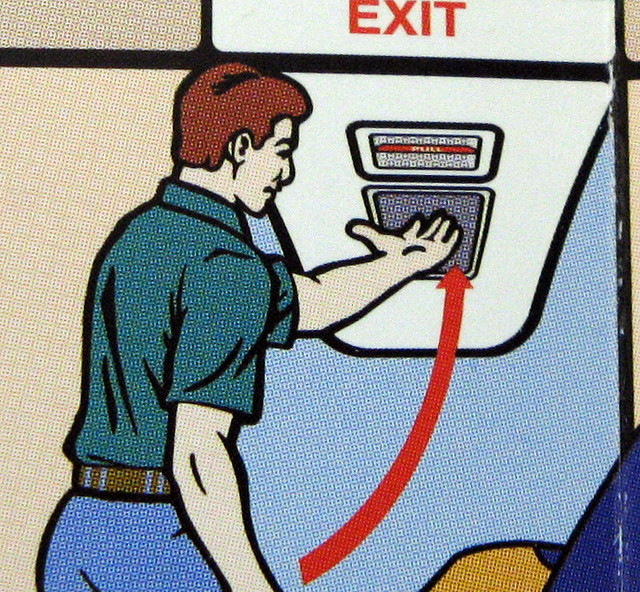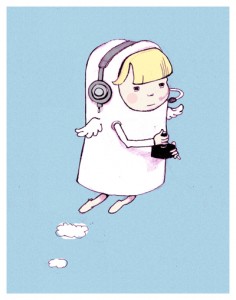
Nobody likes failing.
Whenever I think of some epic stories of failure I am reminded of the Wright Brothers attempting to launch the “Wright Flyer” for the first time in December of 1903. In my imagination I see a crowd of people gathered to see what was about to happen. Everyone is anxious. Here it is: the defining, life-changing moment in history.
And the Wright Flyer failed. The aircraft didn’t fly, it even incurred some minor damage. The Wright Brothers had to scrape their aircraft off the ground, take it back to the lab and start all over again. Three days later the launch was more successful, on the 5th try.
Failing is Embarrassing.
As an online teacher I’ve experienced a number of such flops in my short (or long) 5 years working online. It’s not just about teaching the subject. It’s about everything else that is usually involved: the student recruitment, the product development, a new online course, a new textbook, a new series of video and audio tutorials, a podcast, blog posts, email courses, and the list goes on.
Almost every week I have a meltdown moment when I feel like my well-developed aircraft is not flying … again. I scrape myself off the ground, fix my airplane and then try again, and again, and again.
The online course isn’t selling very well this week. The textbook isn’t as popular as I thought it would be. The mailing list isn’t growing. The blog post didn’t “hit it off.” There’s lots of reasons for a pity party, but I’m past that stage I guess. There’s something in me that refuses to believe that hard work isn’t going to pay off, and so I go back to the drawing board and make changes.
I wonder what it’s like when you’re out there in an open field with a crowd of nosy neighbors and reporters looking up trying to imagine how this heap of metal can take off, and then it never does. Failing is embarrassing. Born in Ukraine, I’m aware of a wide variety of superstitions that caution you not to prematurely share any ideas you’re working on, or else they may not work out.
I wonder if the superstition has been created by the sheer fear of failing, or perhaps fear of the embarrassment that comes after failing. “Protect yourself, don’t disclose anything so when things don’t work out it doesn’t hurt that much because nobody will know that you have failed.” Right?
Well, it doesn’t happen like that when you teach online. Most of the time you are transparent about your projects and products, you have to try out your services to see whether or not they will work. You put together programs, materials, podcasts and design courses in front of your audience, and as you build the interest you hope that your airplane will fly. But somewhere within there’s always this doubt – what if it doesn’t? And all of those onlookers will see the product of my imagination and excruciatingly hard work fall to pieces.
Failing is Necessary for Success.

image by debaird™ via Flickr CC
Sadly, many of my colleagues have quit online teaching for that very reason. “It just doesn’t work,” they’d say. “I’ve tried introducing online teaching to some of my face-to-face students, but nobody gets it.” “I have no idea how people can make money while teaching online…. Where do you find students? I’ve signed up for a paid marketing service, but haven’t got any results from it.”
There are two common sentiments that I find when people quit before they have tried enough times. First, there is this fear of failure. Secondly, once they do fail (which is inevitable) they can’t bear the thought of having to pick themselves up again, face some embarrassment and go back to the “lab.”
But what we neglect to consider is that failing is actually necessary for success, and here are 3 reasons why:
- Failure shows us what’s wrong. When our product or service fails for some reason, we can analyze the process and see what has gone wrong. If we quit after something fails we won’t learn anything about ourselves, our work, our customers and the quality of our product/services.
- Failure helps us make necessary adjustments. When I realize that something doesn’t work as well as it should, I ask my customers to see what adjustments they would recommend. I can also ask some of my professional friends for their opinions. About 2 years ago I published an e-textbook that I was only able to sell to my own clients. I never wondered how to make it accessible for a wider audience. So after all this time, reading and studying I’m going back to my textbook ready to start a push-marketing campaign and actually talk about this product more so I can raise awareness, create demand and sell it better.
- Failure may indicate that our market isn’t yet ready. We tend to think of failures as though they are our own fault. Sometimes they are, and sometimes they are not. 5 years ago I was launching my first teacher training webinars for teachers from Russia and Ukraine, and I was lucky to have 5 participants, but usually I didn’t have more than 2. Webinars were so rare and unusual that people didn’t see their value. 5 years later I run a webinar and have an audience of 100 people. Times have changed, people have become more savvy and webinars are now “in.” Had I quit 5 years ago I wouldn’t experience a much greater turnout and interest in my webinars today.
Failing Means Growing.
If you have children you know what I’m talking about. They are born so cute, cuddly and tiny. But then they start growing and learning new tricks. They fail and fall, but they keep trying over again. They hold their heads, roll over, sit up, stand up, hold their spoon, walk, run, talk, reason, read, and none of these skills come to them spontaneously.

illustration by Diana Koehne via Flickr/CC
Growth happens in the midst of and in spite of some hard falls.
When we grow up we become savvy and refined. Isn’t it what is called “experience?” All of a sudden we must be perfect and everything we do must never fail. Strange, isn’t it? Here are just three ways in which failures indicate our growth.
- Failure matures us. For some reason we want to live in this fairy Neverland where life is happy and bright, nothing stretches or challenges us, and we just want to be comfortable always. But along comes failure and all of a sudden we wake up from the dream of our perfect world and understand that perhaps failure is inevitable in this world, and the sooner we come to grips with this truth the greater our chances are to succeed. If we don’t allow our failures to mature us then we will most likely quit before anything has worked because we’ll be afraid to face the world outside our comfy Neverland.
- Failure helps us to get rid of unnecessary perfectionism. It’s so common for online teachers to keep perfecting their product or service until somebody else has come up with the same idea and implemented it! Our desire for perfection is also driven by the fear of failure, but when we understand that failure is an integral part of any product implementation we will forsake our perfectionism, launch what we have and keep improving it along the way.
- Failure prompts us to explore new territories. When my webinars didn’t take off 5 years ago, mostly due to the state of the market at the time, I decided to try out other things, some of which worked very well. When online courses were new and uncommon just 3 years ago, I created private courses with limited numbers of students in it. Later I had a chance to put together another course and make it public. The time was right, and over 1,500 students signed up within a few months. When something fails and we understand that it’s not uncommon, we begin looking for other ways to promote what we’re doing. From this perspective one cannot underestimate the power of failure.
Although failing may be a bitter pill to swallow it is an integral part of your online business endeavors. It helps you grow up, get to know yourself better, improve your products and services and as a result become more effective, successful and satisfied with your work. The key is not to give up when something fails. Fail, but finish strong.
Conclusion
I call my friend who lives in Nashville, and we decide to spend a weekend together. I go online, book a ticket, and a couple of days later I’m packing my suitcase to go and see her. I board the plane, buckle up my seat belt, and in no time the plane takes off so beautifully and effortlessly.
And as I’m on the plane sipping on my cup of coffee and reading my favorite book I think of the Wright brothers who didn’t give up and had enough courage to persevere despite multiple damages to the craft and their own physical injuries.
Their example is both humbling and inspiring. I now challenge myself with the question, “When my next failure comes along, how will it define me? Will it force me to retreat and quit or will I use it to grow and thrive?”
–

You’ve been reading a guest post by Elena Mutonono
Elena Mutonono transforms language teachers into online teacherpeneurs. Learn how she could help you and check out her new e-book at www.elenamutonono.com
post cover image by debaird™ via Flickr CC